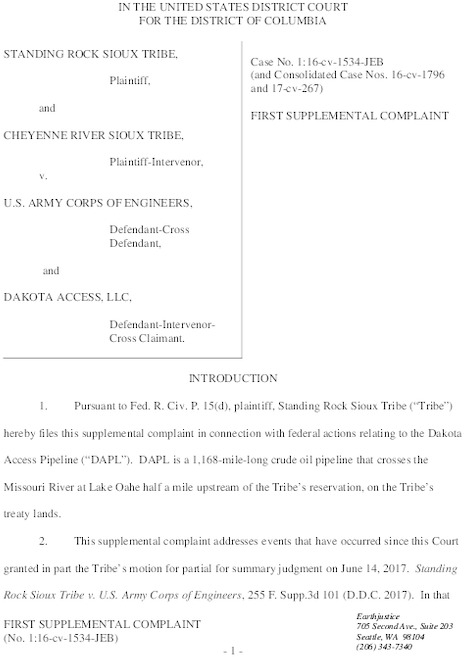From the Open-Publishing Calendar
From the Open-Publishing Newswire
Indybay Feature
Standing Rock Sioux Tribe Renews Legal Challenge Against DAPL
U.S. Army Corps of Engineers downplayed oil spill risk; ignored Tribe’s well-documented concerns
Washington, D.C., November 1, 2018 — A new chapter opened today in the legal fight against the Dakota Access Pipeline (DAPL), as the Standing Rock Sioux Tribe renewed their lawsuit against the U.S. Army Corps of Engineers challenging its recently completed review of the pipeline’s impacts. The Tribe’s lawyers at Earthjustice today filed a supplemental complaint in its existing case, overseen by U.S. District Judge Jeb Boasberg in Washington, D.C.
“The Corps has conducted a sham process to arrive at a sham conclusion, for the second time,” said Mike Faith, Chairman of the Standing Rock Sioux Tribe. “The Dakota Access Pipeline represents a clear and present danger to the Standing Rock Sioux Tribe and its people, and we will continue to fight until the Corps complies with the law.”
“The Tribe tried to work in good faith with the Corps to get an honest assessment of the risks and impacts of installing this pipeline at the doorstep of their reservation,” said Jan Hasselman, lead attorney for the Tribe in the lawsuit. “The Corps simply wasn’t interested. We will see them in court.”
Background
In June 2017, Judge Boasberg ruled in favor of the Standing Rock Sioux Tribe on the pipeline’s environmental review, finding that the Corps had failed to adequately consider the impacts of the pipeline on a number of values critical to the Tribe. The Court ordered the Corps to conduct a new environmental review focusing on those values. Although the Court declined to shut down the pipeline at that time, it imposed a series of measures intended to ensure the safe operation of the pipeline during this “remand” period.
During the remand process, the Corps withheld critical technical information from the Tribe, making it challenging for the Tribe to offer detailed technical comments on the Corps’ flawed analysis. The Tribe sought to highlight the risk of an oil spill in Lake Oahe, which is part of the Tribe’s reservation. Yet the Corps ignored an extensive body of technical material prepared by the Tribe showing that the risks of an oil spill from DAPL — which is managed by companies with the worst safety and compliance record in the nation — are much higher than disclosed. Lake Oahe is central to the Tribe’s culture and economy, and the danger to the Tribe is far greater than previously documented.
The Corps recently released the review of its original decision to grant permits to the Dakota Access pipeline. The review concludes that the Corps’ original decisions were appropriate and lawful. The new complaint, challenging that review, kicks off a second round of litigation before Judge Boasberg that should take around six to nine months to resolve.
Photo: Construction of the Dakota Access Pipeline near New Salem, North Dakota, by Tony Webster Flickr / CC BY 2.0.
https://earthjustice.org/news/press/2018/standing-rock-sioux-tribe-renews-legal-challenge-against-dapl
“The Corps has conducted a sham process to arrive at a sham conclusion, for the second time,” said Mike Faith, Chairman of the Standing Rock Sioux Tribe. “The Dakota Access Pipeline represents a clear and present danger to the Standing Rock Sioux Tribe and its people, and we will continue to fight until the Corps complies with the law.”
“The Tribe tried to work in good faith with the Corps to get an honest assessment of the risks and impacts of installing this pipeline at the doorstep of their reservation,” said Jan Hasselman, lead attorney for the Tribe in the lawsuit. “The Corps simply wasn’t interested. We will see them in court.”
Background
In June 2017, Judge Boasberg ruled in favor of the Standing Rock Sioux Tribe on the pipeline’s environmental review, finding that the Corps had failed to adequately consider the impacts of the pipeline on a number of values critical to the Tribe. The Court ordered the Corps to conduct a new environmental review focusing on those values. Although the Court declined to shut down the pipeline at that time, it imposed a series of measures intended to ensure the safe operation of the pipeline during this “remand” period.
During the remand process, the Corps withheld critical technical information from the Tribe, making it challenging for the Tribe to offer detailed technical comments on the Corps’ flawed analysis. The Tribe sought to highlight the risk of an oil spill in Lake Oahe, which is part of the Tribe’s reservation. Yet the Corps ignored an extensive body of technical material prepared by the Tribe showing that the risks of an oil spill from DAPL — which is managed by companies with the worst safety and compliance record in the nation — are much higher than disclosed. Lake Oahe is central to the Tribe’s culture and economy, and the danger to the Tribe is far greater than previously documented.
The Corps recently released the review of its original decision to grant permits to the Dakota Access pipeline. The review concludes that the Corps’ original decisions were appropriate and lawful. The new complaint, challenging that review, kicks off a second round of litigation before Judge Boasberg that should take around six to nine months to resolve.
Photo: Construction of the Dakota Access Pipeline near New Salem, North Dakota, by Tony Webster Flickr / CC BY 2.0.
https://earthjustice.org/news/press/2018/standing-rock-sioux-tribe-renews-legal-challenge-against-dapl
For more information:
https://earthjustice.org/
Add Your Comments
We are 100% volunteer and depend on your participation to sustain our efforts!
Get Involved
If you'd like to help with maintaining or developing the website, contact us.
Publish
Publish your stories and upcoming events on Indybay.
Topics
More
Search Indybay's Archives
Advanced Search
►
▼
IMC Network




